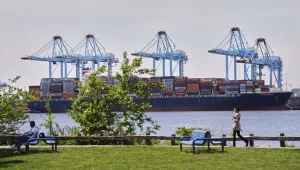Observers have pointed out many parallels between the June referendum on Brexit in the United Kingdom and Donald Trump’s presidential campaign in the US. One parallel is that both the British movement to leave the EU and the Trump campaign for the American Republican nomination achieved success that few had expected, particularly not the various elites. In both cases, the general interpretation is that the elites underestimated the anger of working class voters who feel they have been left behind by economic forces in a fast-changing world, and in particular by globalization.
Another parallel is the centrality to both campaigns of promises that are close to logically impossible, and the consequent inevitability with which supporters will feel betrayed when the promises do not come true. In the United Kingdom, one of the promises that cannot be kept is that if Britain left the EU it could somehow still keep the same trade access to its members, while yet reducing immigration by curtailing free mobility of persons. Another promise that cannot be kept is that the £350 million ($465 million) supposedly sent to the EU each week would be reallocated to the cash-strapped National Health Service. On my side of the Atlantic, Trump says that he will bring back the manufacturing jobs that have disappeared. Secondly, as most Republican candidates do, he promises to enact big tax cuts while simultaneously reducing the budget deficit or even the national debt.
It is true that, for some years, most national income gains have been going to those at the very top, with many workers having fallen behind. Apparently this inequality and globalization, and the perceived connection between the two, play a large role in the anger among many workers that we see in the Brexit and Trump campaigns. It is far from clear that either trade or migration is in fact among the top reasons for widening inequality. But that is the way many see it.
It is certainly true that globalization produces both winners and losers. How can the concerns of angry workers be addressed?
A fundamental proposition in economics holds that when individuals are free to engage in trade, the size of the economic pie increases enough that the winners could in theory compensate the losers, in which case everyone would be better off. Formally it is a case of what economists call the Second Fundamental Welfare Theorem. (The proposition requires that there be no market failures like monopolies or pollution externalities.)
Skeptics of globalization may understand this theorem and yet, quite reasonably, point out that the compensation in practice tends to remain hypothetical. Some of the skeptics suggest that we should recognize political reality, take the failure to compensate losers as given, and so work on trying to slow down or roll back globalization. But an alternative would be the reverse strategy: to take globalization as given and instead work on trying to help those who are in danger of being left behind.
The second strategy is the sensible one, not the first. For one thing, it would be difficult to roll back globalization even if we wanted to. Presumably the policies would include attempting to renegotiate NAFTA or TPP (or, for Britain, the EU), or dropping out of the World Trade Organization, or else unilaterally imposing tariffs and quotas even though they violate existing international agreements. Even leaving aside the negative effects of trade wars on economic growth, anything that a president does would be very unlikely to bring trade back down to the levels of 50 years ago, and still less likely to bring the number of steel jobs back up to the levels of 50 years ago. Globalization is a reality.
That we can’t turn back the clock on globalization is understood fairly widely. But a second point is less often made. In the context of US presidential elections, the choice between the two parties is less a referendum on globalization than it is a choice whether to adopt the specific policies that would help those who are in danger of being left behind. Much is new and different in the 2016 election, but not that.
Policies to help those who are left behind [or, in clinical theoretical terms, to compensate the losers] are precisely where the two parties disagree. They most effective measures, as I see it, are ones that Hillary Clinton and Barack Obama, like his predecessors, try to push and that the Republicans try to block.
The main program to help specifically those who have lost their jobs due to trade is Trade Adjustment Assistance. But why help only the small number of workers who have identifiably lost their jobs due to trade agreements? Wouldn’t it be better to help those who have been left behind regardless if the cause is trade, technology, or something else? Sensible policies to do that include wage insurance, an expanded Earned Income Tax Credit and universal health insurance, among others. Also: a more progressive payroll tax structure, universal quality pre-school, and infrastructure investment spending. These are all policies favored by Democrats. Most have been opposed by Republicans. [Still, one hopes that even if a second President Clinton once again had to deal with a Republican Congress, the two might be able to find common ground in the EITC and infrastructure investment.]
Not long ago, it was possible to admire the sort of political equilibrium achieved by the British electoral system. The two largest parties tended to be led by relatively competent and consistent leaders who represented relatively well-demarcated stances on the issues: right-of-center in the case of the Conservatives and left-of-center on the part of Labor. Voters could make their choices based on the policy issues. Under a parliamentary system, the victorious prime minister could work to carry out the policies that he or she had campaigned on. It compared favorably to the ever-worsening gridlock of the American system, where presidential initiatives could and would be blocked by congressmen from the opposite party, even when the initiatives were consistent with philosophies that they themselves had espoused in the past.
To state the obvious, the British system has broken down. Some of those competent leaders eventually made fatefully ill-advised decisions: Margaret Thatcher’s poll tax, Tony Blair’s support for the US invasion of Iraq, and David Cameron’s decision to hold the Brexit referendum. What is now left is a mess. It is hard to discern much clarity or consistency in the new crop of English politicians. When the next election is eventually held, the voters could well be asked to choose between parties that do not correspond in any clear way to the relevant policy decisions that Britain must make, mainly whether to seek to negotiate a relatively close association with the EU or to cut off completely.
In some familiar ways the American political system has also deteriorated in this election cycle, bringing past trends to a reductio ad absurdum. But the American political situation at the moment has an advantage that the Brits lack: ability for voters to choose what is to be the national policy orientation. The Democrats still favor policies like wage insurance and universal health insurance and the Republicans still oppose them. So American voters in 2016 are still able to make the relevant choice, either for or against policies that deal with the reality of globalization by helping those who are left behind.
Frankel, Jeffrey. “Brexit, Trump, and Workers Left Behind.” July 19, 2016




